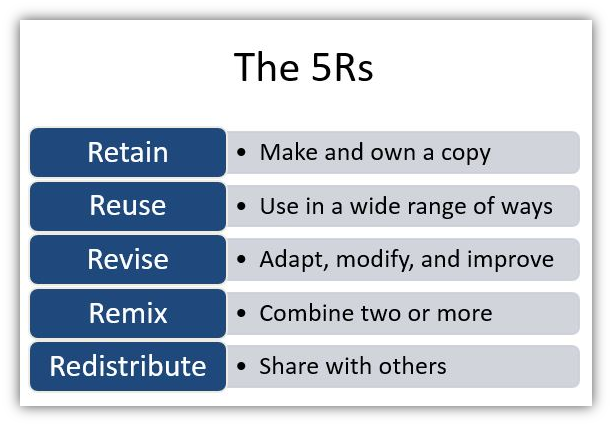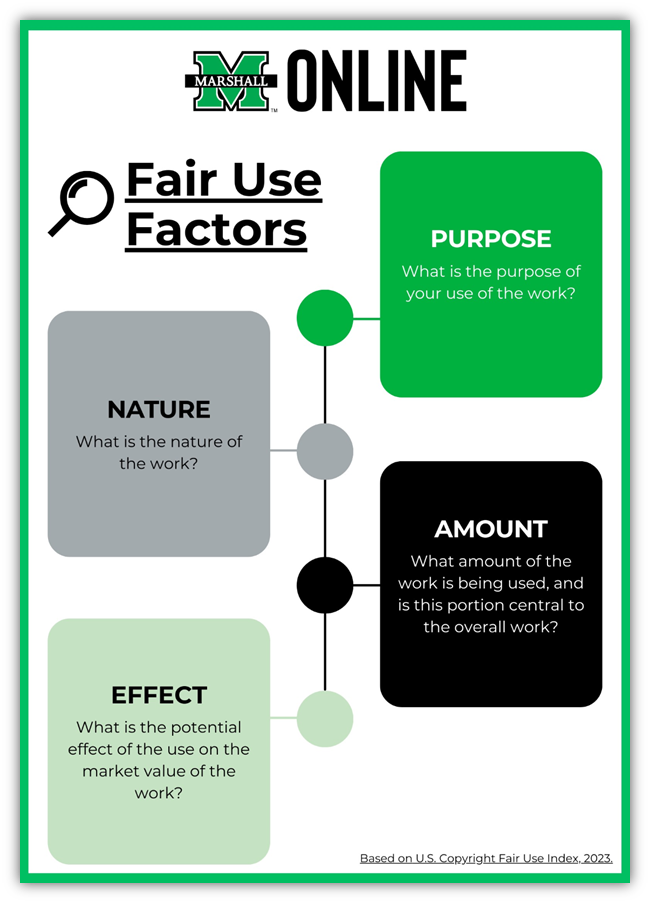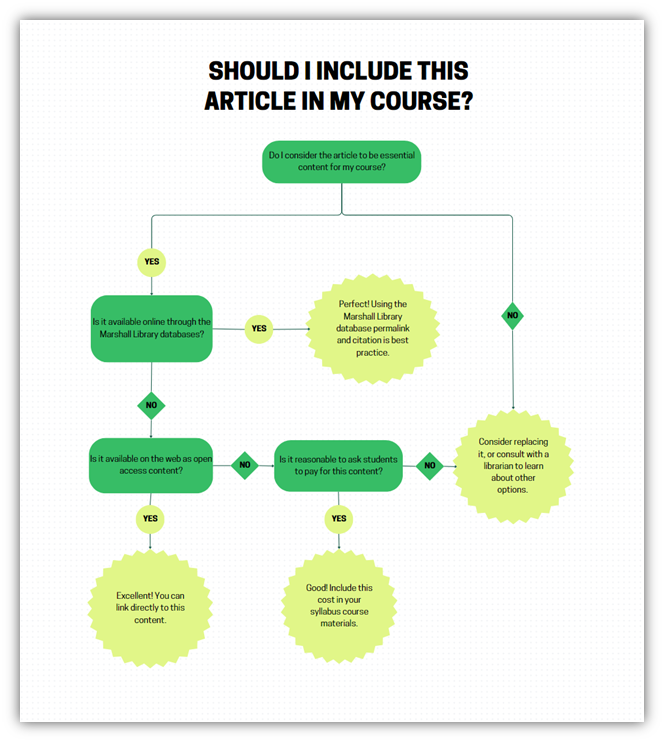Online course development requires a significant amount of time and thought as faculty manage various pedagogical, technological, and institutional considerations. When effectively aligned to learning activities and outcomes, additional instructional materials can enrich a class by offering students diverse perspectives, deeper learning, more multimodal engagement, or more recent content (Jaggers et al.; QM Specific Review Standard 4). Instructors also seek out affordable options for their students to support their success, an effort that aligns with the Marshall for All initiative. We want faculty to feel confident that their thoughtfully chosen course materials reflect permissions guidance and fair use too (QM 4.3), and Marshall has several resources to support those efforts.
Open Educational Resources (OER) at Marshall
Marshall has robust OER opportunities for faculty who are interested in finding quality OERs or attending OER workshops. According to David Wiley of Lumen Learning (and Marshall alum), the five primary components of OER are materials that can be retained, reused, revised, remixed, and redistributed. To help you evaluate a potential OER, try this OER Assessment Rubric from RCampus.

If you are interested in developing your own OER, one Marshall affordable materials initiative is Pressbooks, an open access publishing service. Any Marshall faculty can go into Pressbooks to create their own OER textbook tailored to their class and publish it. Don’t have time for that? Pressbooks also allows faculty to curate content (including interactive videos and learning activities) from other OER textbooks, remix it, and publish as a co-author. Pressbooks is free to students and integrates with Blackboard Ultra, with content showing in-line like other course documents.
Marshall courses that use Pressbooks or other open materials from publishers such as OpenStax, Lumen Learning, and OER Commons may be eligible for the Affordable Education Materials attribute—an initiative spearheaded by the Student Government Association. Don’t know where to begin? Start with Marshall’s Creating and Editing OERs guide.
Fair Use Resources at Marshall
For articles and instructional materials that are not clearly marked as OER, instructors have other options. Building a reading list by collecting articles from various places can help instructors customize their course. Another worthy benefit of posting the readings in a course? It saves students money.
However, just because these materials are intended for educational purposes does not mean they are always in the clear for fair use. Determining fair use is case-by-case and not a straightforward process. Before distributing an article or book chapter for students, instructors need to not only make sure their use of the material meets all four factors (related to the purpose, nature, amount, and market impact of the work used), but also recognize that this characterization is subjective and contextual.

Tools for educators, such as the Fair Use Checklist, can help instructors determine whether or not a text favors fair use and document their analysis in good faith. However, this process may still not produce clear answers. According to the US Copyright Office Fair Use Index, “There is no formula to ensure that a predetermined percentage or amount of a work—or specific number of words, lines, pages, copies—may be used without permission.”
Best Practices for posting affordable online course materials
While instructors should apply an abundance of caution when determining fair use, the good news is that Marshall University Libraries provide a vast selection of instructional materials that faculty can freely use in their courses.
To help you follow best practices for posting an article, book chapter, or story in your Blackboard course, try our flow chart:

- Use a Marshall Libraries permalink: If you wish to post an article to your course at no cost to your students, a best practice is to link directly to the content in Marshall University Library databases using the permalink, as well as the article citation and a link to Marshall Library’s Summon Search. Replacing an article PDF with all three of these elements (permalink + citation + library search information) not only protects your use of the article, but it also allows the library to track journal and database clicks. If students only have a PDF or scanned copy of the article, then the library can’t collect usage statistics — the analytics used to determine subscription renewals. It is also good practice to check these links each semester to ensure the library still has access to the work.
- Link directly to Open Access content: If Marshall University Library does not have the article, check to see if it is Open Access on the web by the owner of the text. Again, it is better to include both the citation and the link rather than uploading a PDF. For YouTube videos, check to make sure they were uploaded (made openly available) by the copyright owner.
- Consult with a Marshall librarian: If the text is not available in the library or open access, consult with a Marshall librarian to explore other options. Library Partners can help faculty replace article PDFs with permalinks and citations, find comparable alternatives, or look into other solutions, such as course reserves. Faculty teaching online courses can contact your Distance Learning Library Partner for support: Sarah Mollette, Associate Professor and Research and Online Learning Librarian.
Using affordable course materials is a worthwhile, if not always a clear, endeavor. Whether you have questions about how to make sure your assigned articles are covered under fair use, how to get training on using OER, or how to create and publish your own OER content, we can connect you to the right resources.
Marshall University Resources
- OER at Marshall: Do you want to find Open Educational Resources for your courses? Reach out to Marshall OER Librarian Larry Sheret to schedule a workshop or get help finding open textbooks published by other colleges and universities.
- Marshall Pressbooks: Do you want to publish OER as an author or co-author? Contact Library Research Specialist Margaret Sullivan for more information about Pressbooks and related grant opportunities.
- Library Partners: Do you have general questions about course materials? Reach out to your department’s Library Partner. Sarah Mollette is the Library Partner for Distance Education courses.
- Marshall Libraries Faculty Services: Do you have a book on your reading list that you want students to access through the library? This page contains forms for faculty to make requests for book purchases and course reserves.
- Marshall Digital Scholar (MDS): Do you have peer-reviewed research that has been accepted for publication? Do you want to share it with your students? MDS is an open access institutional repository, which provides free access to Marshall’s faculty research publications. Participating in MDS can increase the impact factor of your work and help you track analytics.
- Marshall Libraries Copyright Basics: Do you have questions about copyright or fair use? Check out this LibGuide or contact Dena Laton, Library Research and Copyright Education Specialist, at dena.laton@marshall.edu.
Additional Resources
- How to Find Quality Open Educational Resources: This guide by Wiley Education Services covers OER alignment, search, and evaluation strategies.
- Creative Commons: This Creative Commons search tool can help you find open access content.
- Copyright Clearance: This site allows you to search for a text to request or purchase permissions.
- Using Electronic Resources to Build Reading Lists: This guide by Columbia University Libraries specifically addresses fair use considerations in the context of an LMS, such as Blackboard.
- Stanford Copyright and Fair Use: Academic and Educational Permissions: This resource includes guidance on measuring the four fair use factors and summaries of several fair use cases.
References
Jaggars, S.S., Prieto, K., Rivera, M.D., & Folk, A.L. (2022). Using Affordable Course Materials: Instructors’ Motivations, Approaches, and Outcomes. Libraries and the Academy 22(2), 305-334. https://doi.org/10.1353/pla.2022.0019.
QM Specific Review Standards from the QM Higher Education Rubric (2023). Quality Matters, StandardsfromtheQMHigherEducationRubric.pdf (qualitymatters.org)
U.S. Copyright Office Fair Use Index (2023). U.S. Copyright Office, https://www.copyright.gov/fair-use/
Wiley, D. Defining the “Open” in Open Content and Open Educational Resources is licensed under CC BY 4.0, Open Content Blog, https://opencontent.org/definition
Note: Since copyright laws are dynamic and nuanced, these recommendations (updated Fall 2023) may not reflect the latest updates and should not replace legal advice. For faculty permissions questions at Marshall University, reach out to your Library Partners.